-
-
NetScaler Console on Microsoft Hyper-V
-
Migrate NetScaler Console single-server deployment to a high availability deployment
-
Integrate NetScaler Console with Citrix Virtual Desktop Director
-
-
-
-
Scenarios for Flexed or Pooled license expiry and connectivity issues behavior
-
Configure NetScaler Console as the Flexed or Pooled license server
This content has been machine translated dynamically.
Dieser Inhalt ist eine maschinelle Übersetzung, die dynamisch erstellt wurde. (Haftungsausschluss)
Cet article a été traduit automatiquement de manière dynamique. (Clause de non responsabilité)
Este artículo lo ha traducido una máquina de forma dinámica. (Aviso legal)
此内容已经过机器动态翻译。 放弃
このコンテンツは動的に機械翻訳されています。免責事項
이 콘텐츠는 동적으로 기계 번역되었습니다. 책임 부인
Este texto foi traduzido automaticamente. (Aviso legal)
Questo contenuto è stato tradotto dinamicamente con traduzione automatica.(Esclusione di responsabilità))
This article has been machine translated.
Dieser Artikel wurde maschinell übersetzt. (Haftungsausschluss)
Ce article a été traduit automatiquement. (Clause de non responsabilité)
Este artículo ha sido traducido automáticamente. (Aviso legal)
この記事は機械翻訳されています.免責事項
이 기사는 기계 번역되었습니다.책임 부인
Este artigo foi traduzido automaticamente.(Aviso legal)
这篇文章已经过机器翻译.放弃
Questo articolo è stato tradotto automaticamente.(Esclusione di responsabilità))
Translation failed!
NetScaler Console on Microsoft Hyper-V
To install NetScaler Console on Microsoft Hyper-V, you must first download the NetScaler Console image file to your local computer. Also, ensure that your system has the hardware virtualization extensions, and verify that the CPU virtualization extensions are available.
Prerequisites
Before installing the NetScaler Console virtual appliance, verify that the following requirements have been met:
-
Microsoft Hyper-V version 6.2 or later is installed on hardware that meets the minimum requirements.
-
Install Microsoft Hyper-V Manager on a management workstation that meets the minimum system requirements.
-
You have downloaded the NetScaler Console image file.
Microsoft Hyper-V system requirements
Microsoft Hyper-V is a Windows client application. The following table describes the minimum system requirements.
| Component | Requirement |
|---|---|
| Operating System | Windows Server 2012 R2 |
| .NET framework | Version 2.0 or later |
| CPU | 750 MHz (MHz), Recommended: 1 gigahertz (GHz) or faster |
| RAM | 1 GB, Recommended: 2 GB |
| NIC | 100 megabits per second (Mbps) or faster NIC |
Installing NetScaler® Application Delivery Management
The number of NetScaler Console servers that you can install depends on the memory available on the Hyper-V server.
To install NetScaler Console:
-
Start the Hyper-V Manager client on your workstation.
-
On the Action menu, click Import Virtual Machine.
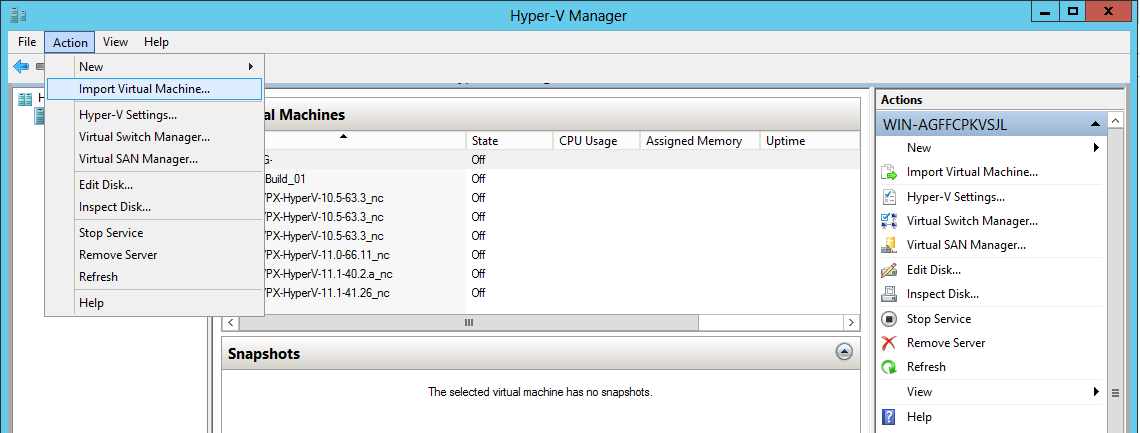
-
Import the Hyper-V image, and do the following:
-
In the Import Virtual Machine dialog box, in Locate Folder section, browse to the folder in which you saved the NetScaler Console Hyper-V image, select the folder, and click Next.
-
In the Select virtual machine section, select the appropriate virtual machine name.
-
In the Choose Import Type section, select Copy the virtual machine (create a new unique ID) option and click Next.
-
In the Choose Destination section, you can specify the folders to store the virtual machine files.
Note
By default the wizard imports the virtual machine files to default Hyper-V folders on your local host.
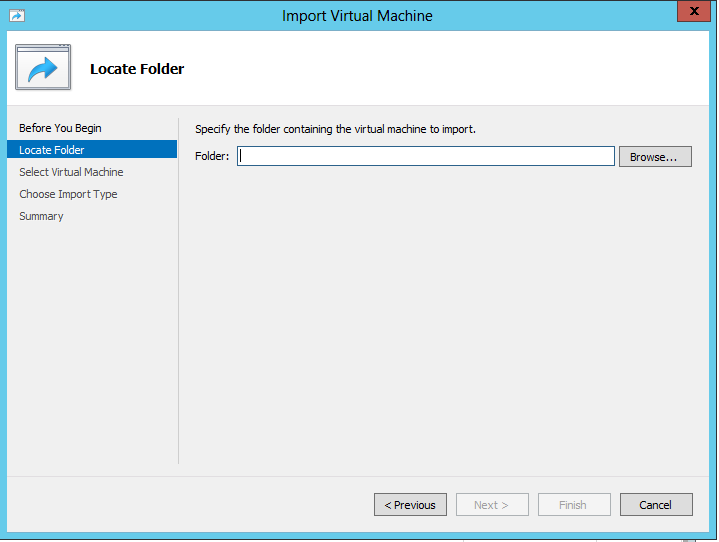
-
In the Choose Storage Folders section, you can select the location in which you want to store the virtual hard disks, and then click Next.
-
You can verify the Virtual Machine details in the summary pane, click Finish.
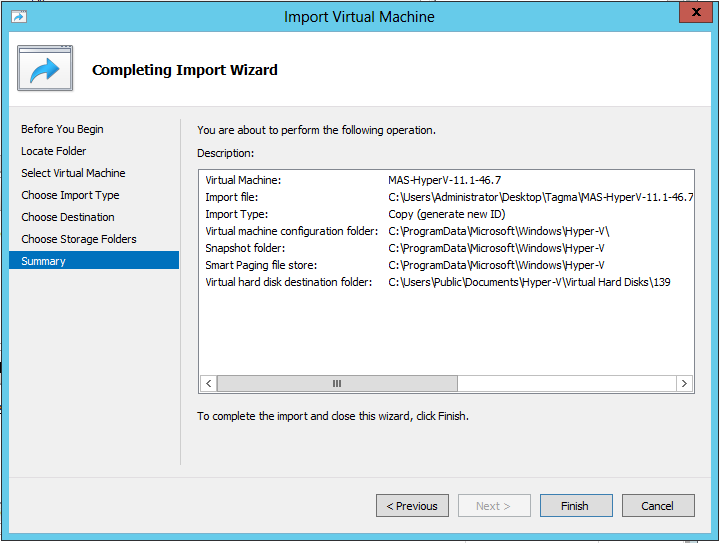
The NetScaler Console Hyper-V image is displayed in the right pane.
-
-
Right-click the NetScaler Console Hyper-V image, and then click Settings.
-
In the left pane of the dialog box that appears, navigate to Hardware > VM_Bus Network Adaptor, and in the right pane, from the Network list, select the appropriate network.
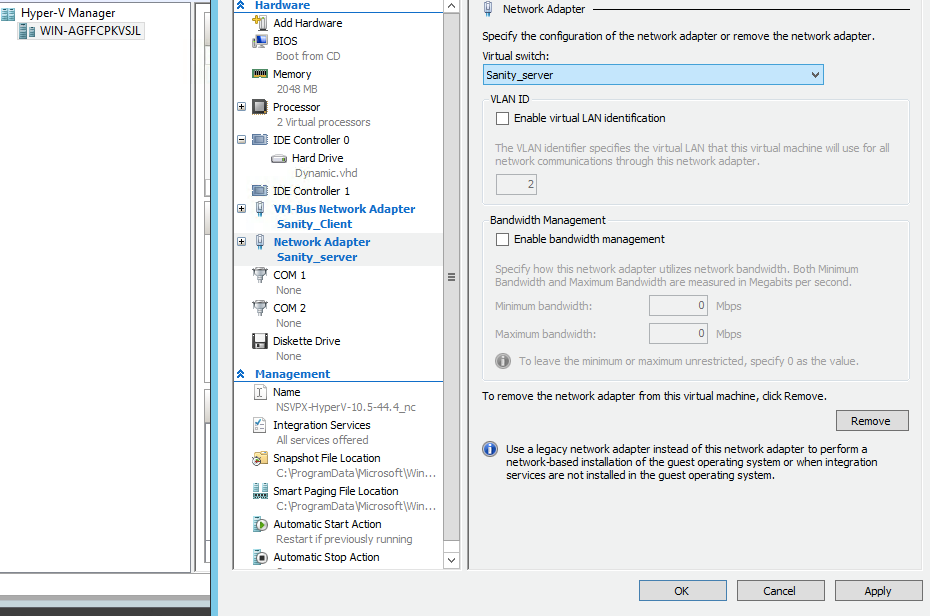
-
Click Apply, and then click OK.
-
Right-click the NetScaler Console Hyper-V image and click Connect.
-
On the Console window, click Start button.
-
Configure the initial network configuration options.

-
After specifying the required IP addresses, save the configuration settings.
-
When prompted, log on using nsrecover/nsroot credentials.

Note
After you log on, if you want to update the initial network configuration, type
networkconfig, update the configuration, and save the configuration. -
Run the deployment script by typing the command at the shell prompt:
deployment_type.py <!--NeedCopy-->
-
Select the deployment type as NetScaler Console Server. If you do not select any option, by default, it is deployed as a server.
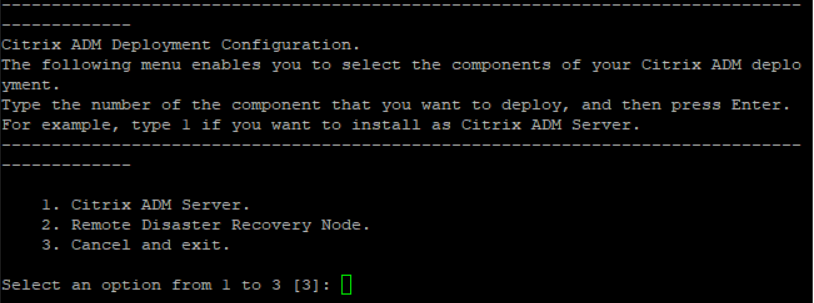
-
Type Yes to deploy NetScaler Console as a standalone deployment.
-
Type Yes to restart the NetScaler Console server.
Note
After you install NetScaler Console, you can update the initial configuration settings later.
Verification
After the server is installed, you can access the GUI by typing the IP address of the NetScaler Console server in the address bar of your browser. The default administrator credentials to log on to the server are nsroot/nsroot.
The browser displays the NetScaler Console configuration utility.
Share
Share
This Preview product documentation is Cloud Software Group Confidential.
You agree to hold this documentation confidential pursuant to the terms of your Cloud Software Group Beta/Tech Preview Agreement.
The development, release and timing of any features or functionality described in the Preview documentation remains at our sole discretion and are subject to change without notice or consultation.
The documentation is for informational purposes only and is not a commitment, promise or legal obligation to deliver any material, code or functionality and should not be relied upon in making Cloud Software Group product purchase decisions.
If you do not agree, select I DO NOT AGREE to exit.